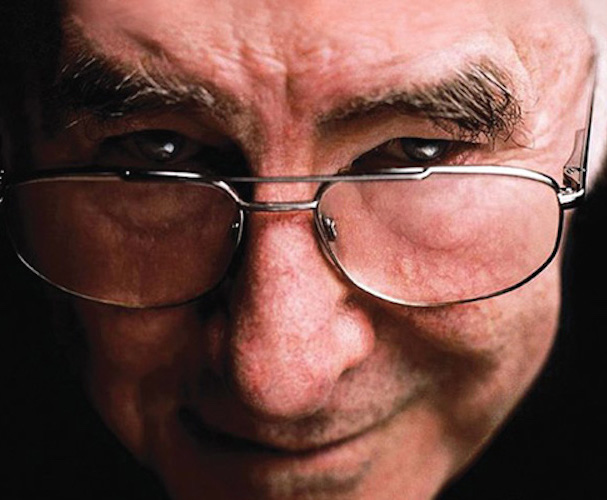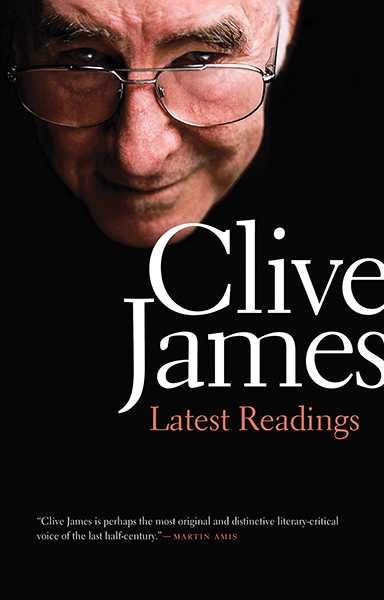Book Review: Critic and Poet Clive James—Reading and Writing Until the Lights Go Out
Clive James eagerly gets the most out of whatever’s on the page and isn’t shy about making larger connections with history, politics, and the inexorable flow of time.
Latest Readings by Clive James. Yale University Press, 192 pages, $25.
By Matt Hanson
As every bibliophile knows, the attempt to read everything is ultimately a losing battle. No matter how often you stroll through the library or how many bookstores you haunt, there’s never world enough and time to read it all: the stacks of books you can’t afford to miss loom like mountains that you’ll never have the chance to climb. Clive James, the loquacious and erudite Australian-English author of dozens of books of memoirs, criticism, fiction, and poetry knows this reader’s dilemma better than anyone.
Five years ago, James was diagnosed with terminal leukemia. He has made inspiringly good use of what time he has left, having since published his translation of Dante’s Divine Comedy, a new book of poems, and a collection of criticism. Recently, Yale University Press has published Latest Readings, a series of essays about his recent adventures in reading. As James tenaciously puts it in the introduction, “if you don’t know the exact moment when the lights will go out, you might as well read until they do.”
We’re lucky to still have him around. The courageous James is keeping his vitality and critical eye intact as his existential clock winds down. James writes in an endearingly personal voice about recommitting himself to stocking his ever-growing home library, and how the joy he takes in reading and collecting books hasn’t diminished, unlike his physical state. Each of Latest Reading’s slim, brisk essays feels like sitting with a genial old friend as he recites from and comments on the pile of books he keeps close at hand. Sometimes the only thing better than reading a book is hearing someone talk about it.
The essays in Latest Readings cover an intriguingly wide range of material, including highbrow volumes by Joseph Conrad, W.G. Sebald, and Samuel Johnson, as well as more popular fare. Apparently James read straight through all 20 volumes of Patrick O’Brien’s swashbuckling Master and Commander series and loved every minute of it. For all his erudition, James is no snob or curmudgeon. He doesn’t gripe about digitization or the omnipotence of mass media. He doesn’t discriminate between Important Literature and Fun Stuff. Instead, he eagerly gets the most out of whatever’s on the page and isn’t shy about making larger connections with history, politics, and the inexorable flow of time.
In each of the 30 essays, James revisits old favorites like Hemingway, who merits two ambivalent but appreciative chapters, biographies of fascists and movie stars, Anthony Powell’s A Dance to the Music of Time, V.S. Naipaul, Philip Larkin (whose first collection James reviewed decades ago), and a variety of poets old and new. He rereads Shakespeare for the umpteenth time, preferring the Roman plays and the tragedies, about which he still has illuminating insights:
“In Anthony and Cleopatra, T.S. Eliot thought that the line most worth talking about comes from Charmain when she dies: ‘Ah, soldier!’ I have always thought that Eliot was right…Charmain has so little to say at the crucial moment, and the soldier, of course, has even less. But it is the way the words are placed. The handmaiden’s transition unto death was almost nothing, a pinprick: and yet for her it was a revelation. How great the great poet was, to know that.”
It’s interesting to hear what James is reading as well as how he’s reading it. Environment can play a big role in the reading experience: Part of what you remember later is what was happening around you as the pages turned. We see James exercising his weakened legs by marching up and down his kitchen floor, memorizing the layout so he can read Kipling’s poems aloud to the beat of their militant, soldierly rhythm without crashing into the furniture.

Clive James—his vitality and critical eye remain intact.
Given his limited mobility, it’s heartwarming to read about his “limping the half-mile to the bookshop” only to come back with fresh bundles of books to fill his creaking shelves. “As I was scheduled to die off myself, it was madness to start making small piles of books that I wanted to take home. But the madness was divine.” Amen to that, as any bookseller will tell you.
There’s something especially poignant in the way James describes how he rereads Anthony Powell’s multivolume generational chronicle A Dance to the Music of Time in his backyard in late summer as the heat of the day subsides. He spends an agonizing night in the hospital becoming reacquainted with the work of Joseph Conrad, rereading Lord Jim while tossing and turning in sweat-soaked sheets. Conrad’s work never did much for him before, but there was something in the stories that wouldn’t let him go this time around. James convincingly analyzes why Conrad’s tragic sense of civilization and barbarism in conflict still has much to teach us a century later.
Toward the end of the book, James notes that there is a plaque in Cambridge’s Trinity College chapel honoring Wittgenstein, who “released thought from language.” James suggests the inscription for his own plaque, if he were to have one: “he loved the written word, and he told the young.” It’s a movingly accurate description of a writer whose bone-deep commitment to the written word makes it vibrantly clear that he will still be reading and writing until the lights go out.
Matt Hanson is a critic for The Arts Fuse living outside Boston. His writing has appeared in The Millions, 3QuarksDaily, and Flak Magazine (RIP), where he was a staff writer. He blogs about movies and culture for LoveMoneyClothes. His poetry chapbook was published by Rhinologic Press.
Tagged: Clive James, Latest Readings, literary-essays, Matt Hanson


Hi, Matt: As someone who plans to be reading away on my deathbed, I appreciate your excellent essay.
Thank you Gerald…I’ve been a fan of James for a few years now, so it’s too bad I won’t be able to see much more of him.
As a lover of books since I learned how to read, I appreciate Clive’s trip to the book store and his desire to spend his remaining days glued to the page. Its true we can’t take them with us when we go but the words embed themselves in our hearts and make us who we are, people enriched by the thoughts and experiences of others; that part is eternal. God Bless you, Clive! Good essay, Matt!